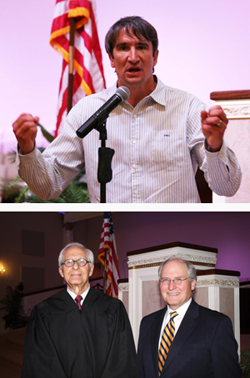
Administrative Office of Courts
|
19 people graduate from Eighth Circuit Drug Court May 5, 2017 A 35-year-old former nurse will work to regain a nursing license after completing four years in the Eighth Judicial District Drug Court. A 36-year-old high school dropout looks forward to enrolling in college. A 32-year-old mother of three aims to be a good parent and “just be the good person that I always have been that was overwhelmed by addiction.”
Drug Court Coordinator Marcus Ellis noted that court always opens with the admonition “All rise.” Those two words that have become the mantra of drug courts across the country “capture the essence of what a drug court does,” he said. “‘All Rise’ describes how instead of casting out and discarding an addict, drug courts insert hope and support into the very lives of people who the traditional justice system say are hopeless.” “‘All Rise’ describes drug court as a place where instead of prison, addicts receive the right mix of treatment and accountability needed to change their lives; instead of hopelessness, they receive a solution; instead of indifference, they are shown compassion; instead of judgment, they are given assistance; instead of punishment, they are provided a passport to recovery,” Ellis said. “‘All Rise’ demands that we all see beyond the chaos and wreckage in a person’s life to their potential, hope and humanity, and we act, because we know that when one person rises out of drugs and crime, we ‘all rise.’” Several graduates confessed that they came into the program not aiming to kick drugs, but rather trying to figure out how they could fool the drug test and still do drugs. One told staff on her first day, “I think I’d just rather go to jail.” Another recalled that he accepted drug court to avoid jail. He had been to jail and didn’t want to go back. “If it weren’t for this program, I’d probably be somewhere dead,” he said. “This is a journey, a privilege, a blessing,” a 25-year-old man told the crowd. “I’m grateful,” a 37-year-old mother said. “Some people say it’s hard. If you’ve got kids, it’s worth fighting for.” The last man through the line of graduates shook hands with judges and staff, accepted his graduate certificate, thanked the judges and staff and offered what had become a refrain: “If I can do it, anybody can do it.” Circuit Judge Vernon R. Cotten, who has announced that he will retire May 31, presided at his final Drug Court graduation. He posed four questions for graduates to consider: Who am I? Why am I here? Where am I going and how can I get there? Invoking scripture, he said that all are created in God’s image and have value. “Some of you had given up on yourselves. ‘How I have wasted my life.’ When does God ever give up on you, or any of us?”  Guest speaker Philip Prince, a Neshoba County businessman and frequent youth ministry volunteer, told the graduates, “In this room are people who are fighters, who have come through some valleys and some tough times....In order for us to go forward, you’ve got to stop looking back.” Faith in God and faith in themselves sustains people during their struggles, Prince said. He told them to be thankful. “We have to be a people who are thankful, every breath that we take.” He also challenged them to help others who struggle with addiction. “It’s our role to go find the other people who are broken,” he said. “Maybe yet there is still work to be done.” Supreme Court Chief Justice Bill Waller Jr. told graduates, “You have been through a lot...and now God has given you a second chance. I want you to be surprised by joy as you walk through that door.” He praised Judge Cotten’s innovation through the Drug Court. “He is one of those who has taken the position and has taken it to the next level.” Judge Cotten founded the fourth drug court in the state in 2003. The Eighth Judicial District Drug Court became the first to be certified by the Administrative Office of Courts, and has been recognized nationally for its work. Circuit Judge Christopher Collins said that the Eighth Circuit currently has the largest enrollment of any drug court in the state, with 302 participants. The program developed special tracks for DUI offenders and for military veterans. Under Judge Cotten’s direction, the program accepts probation violators to address their drug addiction. He told Judge Cotten, “I know this is your heart and I ask you to pray for us. We are going to endeavor to be the best stewards of this Drug Court.” #### |